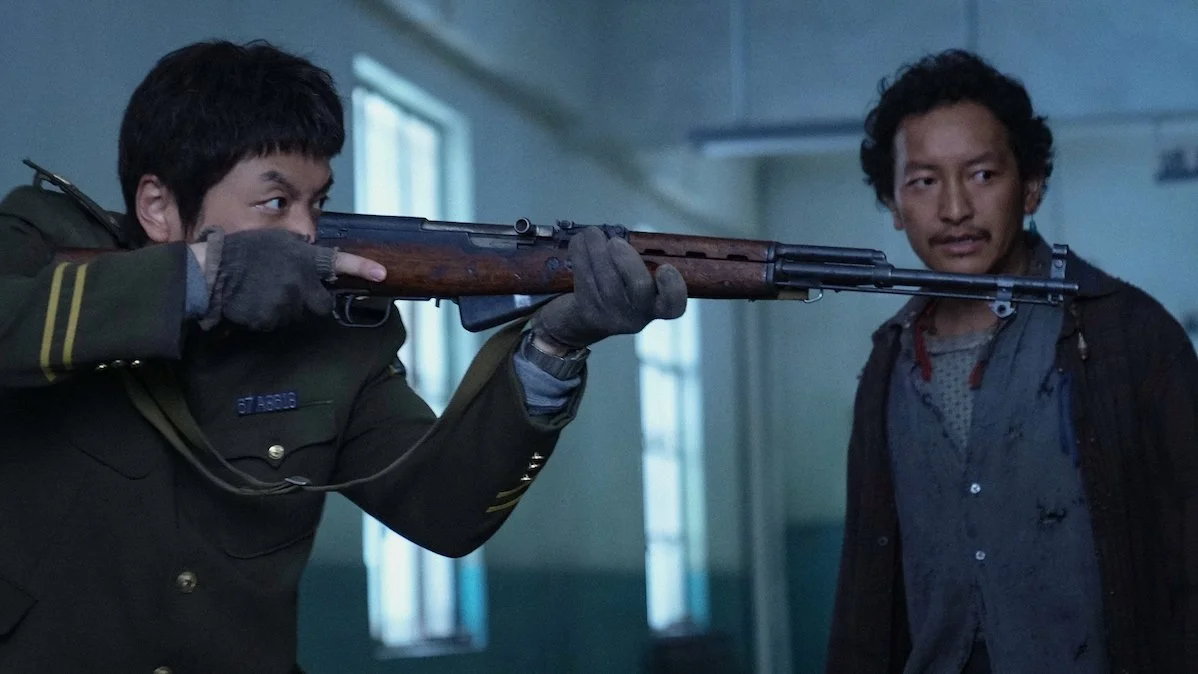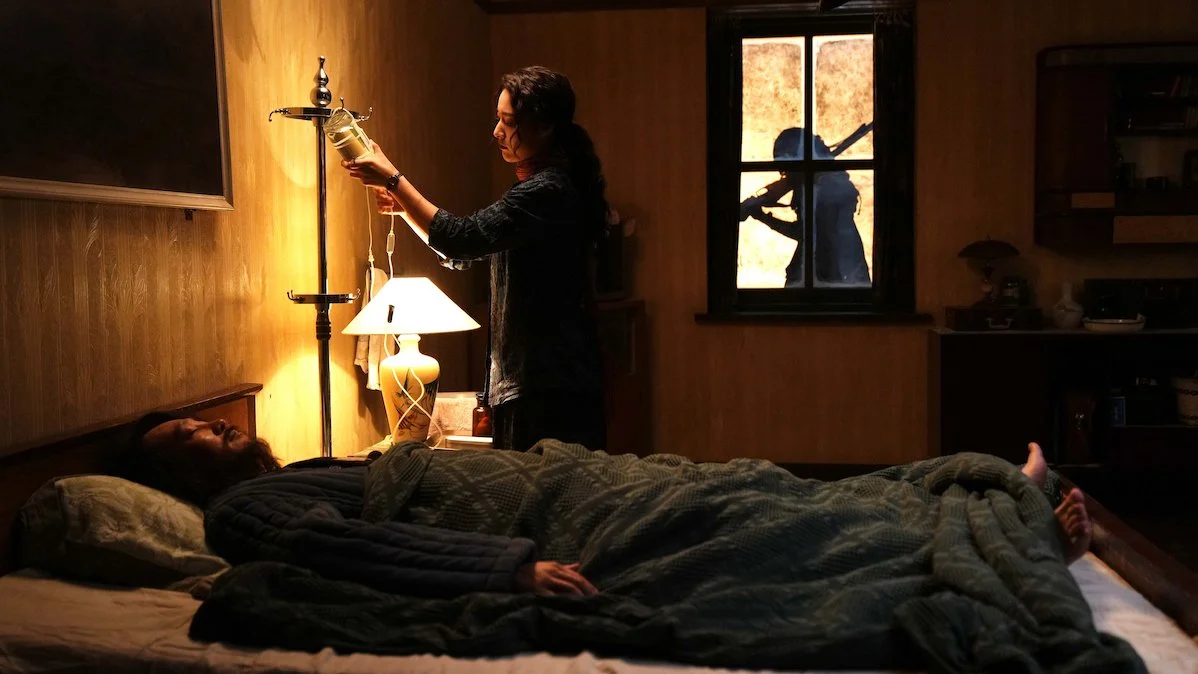Sand Blasted
it’s got a ton of influences but editor-turned-director Sagara’s western-noir debut has a pretty good handle on them.
Trapped
Director: Zhang Qi • Writer: Sun Yue, Zhang Qi
Starring: Bai Ke, Xin Baiqing, Lang Yueting, Sun Ning, Zhuo Jie Zeren
China • 2hrs 10mins
Opens Hong Kong June 5 • IIB
Grade: B
It’s 1995 in the desert mining outpost Mangya, a border town where Putonghua, Mongolian and Tibetan are tossed around with ease and its remaining residents are preparing to get out of dodge ahead of a looming sandstorm – or scatter for more prosperous locales. Like Shenzhen, where a young woman, Li Li (Rebecca Li Manxuan), is heading any day now. Among the denizens of this dying backwater is Xia Ran, also known as Night Owl (Bai Ke, or White-K, Johnny Keep Walking, Detective Chinatown 1900), the local constable who doesn’t have much to do; his work mostly consists of keeping the peace between shepherd Ma Xiaozhi (Xue Xuchun) and his rival Dorje (Zhuo Jie Zeren), who are beefing for some reason. One night, a gang of thieves drops into the gas station on the outskirts with their boss Zhao Beishan (Xin Baiqing, The Eight Hundred), freshly escaped from prison but in dire need of medical attention. They’ve picked this gas bar because its close proximity to Mangya will make it easy to retrieve the treasure Beishan buried around town years before. The next morning when Xia goes by for gas, he finds the pumps drained and the attendant missing. Something’s not right.
Thus begins director Zhang Qi’s (or Sagara) Trapped | 大風殺, a neo-western noir thriller cut from the same cloth as Ning Hao’s No Man’s Land and the Coens’ Blood Simple, with a chaser of John Carpenter’s Assault on Precinct 13 thrown in for good measure. Fans of those films are going to recognise the language immediately: the remote location, the dusty-sexy physical spaces, the simultaneously spartan and rich landscape, precisely captured by cinematographer Wang Jiehong with a red and green wash that pops against the blue or sepia desert canvas. Zhang sets the tone quickly and efficiently, all rickety iron and bleached dirt roads signalling uneasy transition at a time of rising development. Unfortunately editor turned director Zhang and writer Sun Yue (or Sahaja) can’t keep up the pace, throwing layer upon layer of excess plotting that frequently kills the momentum.
The key players are here too. On the townsfolk side are Xia, the classic reticent loner-hero sheriff with a traumatic past as a soldier, and his deputies: untested rookie Jian Ning (Sun Ning) and one-time tour guide Zuo Luo (Li Xiaochuan), who’s about to retire. Uh oh. You know what that means. Of course, there’s Ma and Dorje and, crucially, Li Li’s sister Li Hong (a low-key affecting Lang Yueting, still waiting for a role as strong as her breakout Mountain Cry), the femme fatale who runs the Tomorrow Restaurant – effectively the town saloon. On the outlaw side are Zhou’s second in command Qu Maduo (Geng Le, Girls on Wire), his money man The Accountant (Zhang Benyu), sniper She Tou (Li Gan) and 40 other heavily armed bandits about to lay siege to the town from within. Qu heads to Mangya first, to get a lay of the land and threaten Li Hong in order to secure the map to the buried loot. Yup, she knows Zhou, and not only does Qu demand the map, he stashes the comatose Zhou in one of Hong’s guest rooms. Naturally, the gang members increasingly get itchy fingers waiting for Zhou to recover and the in-fighting starts, which puts the lingering villagers in the line of fire and compels Xia and his weaponless lawmen – they have one pistol and about nine rounds between them – to protect them somehow. And that deadly sandstorm? Still bearing down on Mangya. Then Zhou wakes up.
As is the case with any western, all this is build-up to an inevitable showdown between Xia and Zhou. Actually several showdowns, because Zhang and Sun get tempted into piling on extra gang drama we – and the story – don’t need. Working from the premise of there being no honour among thieves laces the story with plenty of nihilism and sudden violence and consequences for the characters. To its credit Trapped goes down roads a lot of films like it don’t, and isn’t afraid of jettisoning the miraculous rescue/escape. It lends a dead-end tone to the story and gives weight to Xia’s apprehension that Bai, who’s known more for being funny, demonstrates with just the right amount of weariness. He’s got a solid sparring partner in Xin, who brings a nice swagger and misplaced arrogance to Zhou. Somewhere in the second act, though, Trapped goes off the rails, and when the action moves beyond the boundaries of Mangya into crime thriller territory, all is lost. By weaving in late-addition story threads and bandits we’ve never seen in an effort to bring that sandstorm into the grand finale Zhang fucks with the film’s pacing and tips into narrative bloat.
Of course, Trapped comes with the state seal of approval, so there’s a self-aggrandising policy message here: the action takes place just before China passed its comprehensive gun control legislation in 1996 and Sun had to make room. The bandits getting caught up in a sandstorm that literally blows them away isn’t the most subtle image, but hey. No one said it had to be. It’s also entirely expected so the problem once again goes back to story bloat. Twenty bandits would have sufficed. A leaner, meaner version of Trapped exists in Sun’s head (and includes the sandstorm set piece) and on Zhang the editor’s hard drive, but there’s no denying they’ve nonetheless nailed the Sino-western genre mash-up vibe. Close, but no dice. This time.



